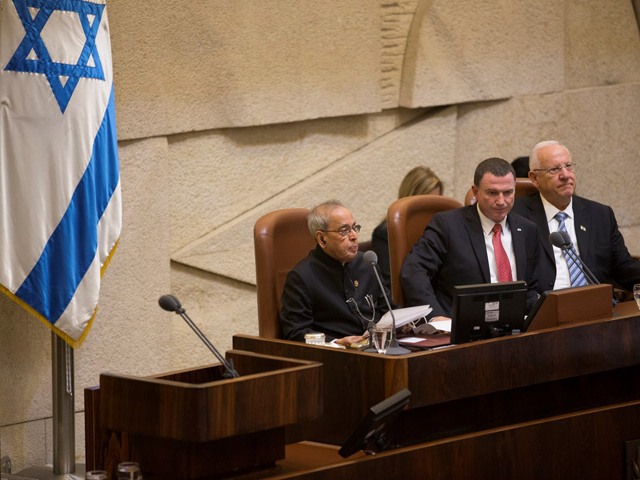Knesset holds special session for Indian President Mukherjee
-
-
10/14/2015
GovXShortDescription
President Mukherjee:" We admire the will and resolve you have shown in building your nation under difficult circumstances. As we approach the 25th anniversary of full diplomatic relations, we seek to expand the vision of our future partnership."
-
-

 President Mukherjee, Knesset Speaker Edelstein and President Rivlin at special session of Knesset
Copyright: Avi Dodi
President Mukherjee, Knesset Speaker Edelstein and President Rivlin at special session of Knesset
Copyright: Avi Dodi
|
GovXContentSection
(Communicated by the Knesset Spokesperson)
Knesset Speaker Yuli-Yoel Edelstein, who opened the special plenary session, said Israel and India have tightened their cooperation in various fields, including security and agriculture.
Turning to President Mukherjee, Edelstein said, "The plenary hall before you best demonstrates that Israel is a democratic, pluralist and diverse country. Sitting side by side here are representatives of all of Israel's citizens: Religious and secular, Jews and adherents of other religions, natives and immigrants."
"Israel is a young country, only 67 years old, but in such a short time in historical terms it has had tremendous achievements, to a large extent due to its ability to persevere and adhere to the values and goals that were set in its Declaration of Independence, including the preservation of liberty and human rights [for all its citizens]," Edelstein said.
The Knesset Speaker further told the Indian president, "Unfortunately, to this day many of our neighbors have not accepted our existence. To our regret, you are visiting us at a tense time, in which another wave of terror is rising from some of our enemies, who have chosen to continue along the path of violence, terror and bloodshed with the encouragement, fanning [of the flames] and severe and prolonged incitement against us - against Israel and the Jews."
Edelstein mentioned the deadly terror attacks carried out by Islamic extremists in India, including the 2008 attack on the Chabad House in Mumbai. "Any sensible person knows that you cannot reach an agreement, and certainly not peace, by shooting and stabbing innocent people on our streets and in our homes," the Knesset Speaker said. "This is not a 'war of liberation' from the burden of occupation; we are witnessing part of a much broader struggle, an all-embracing [struggle] between cultures, nationalities and religions," Edelstein continued. "The terror elements, in their various names: al-Qaeda, ISIS, Hamas, Hezbollah and their like in the Middle East, are trying to use violence in order to impose their way and establish their rule. [India and Israel] are joining hands in the fight for the future of the sane and enlightened world."
In his address before the Knesset Plenum on Wednesday, Indian President Pranab Mukherjee said, "The modern period witnessed our parallel struggles against British rule. Our leaders adopted different methods but were inspired by the same human values and ideals. I was pleasantly surprised to learn that Mahatma Gandhi is the only world leader whose picture is hung in David Ben-Gurion’s desert home."
"We admire the will and resolve you have shown in building your nation under difficult circumstances," he said. "The Jewish people have always been an integral part of India's composite society," said Mukherjee, who thanked Israel for "rushing critical defense supplies in 1999."
The Indian leader told the Knesset, "Our countries should collaborate in the field of agriculture. Israeli technological advances can enhance India's industrial production. Collaboration can create more jobs both in India and Israel."
The Indian President continued to say that his country's "consistent policy has been to build a strong, substantive and mutually beneficial relationship with Israel. We will continue to do so through high level visits and exchanges so that India-Israel relations are accorded the utmost priority. As we approach the 25th anniversary of the establishment of full diplomatic relations, we both seek to expand the vision of our future partnership."
Mukherjee further said that India has always been a strong voice of democratic countries in multinational forums, adding that "today's UN should be more responsive to the challenges the world is facing now."
-
-
-
-
-
-
-
-
-
-
-
-
-
-
-
-
-
-
-